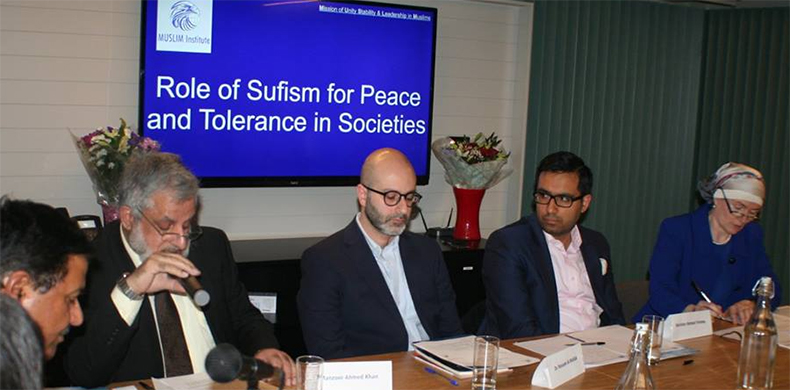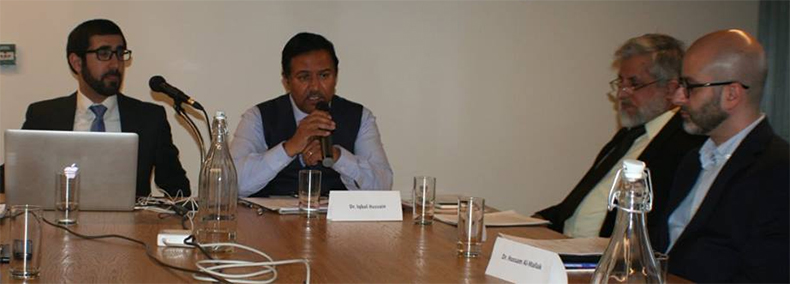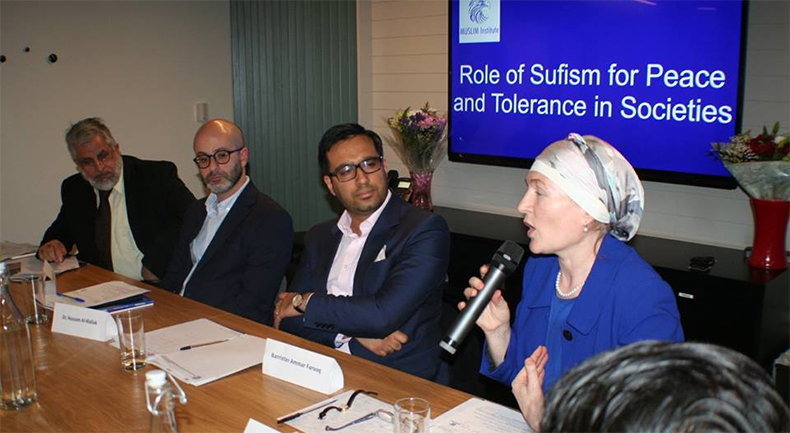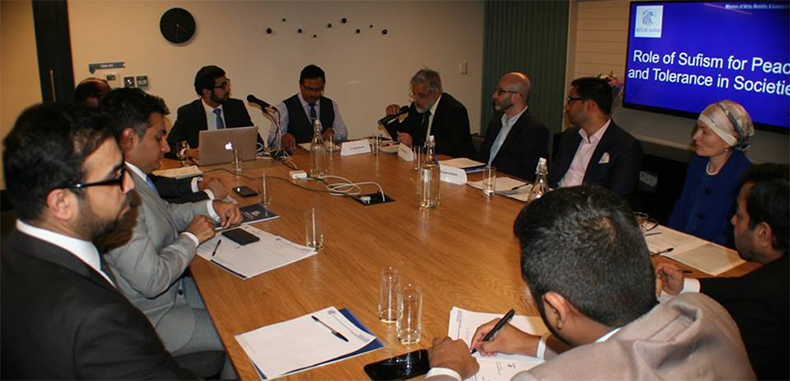Report of RTD on Role of Sufism for peace and tolerance in societies
 |
|
MUSLIM Institute - UK Chapter organised a Round Table Discussion “Role of Sufism for peace and tolerance in societies” on Tuesday May 1, 2018 at the Record Hall, London. Dr. Hussam Al-Mallak (Senior Teaching Fellow, SOAS University & Kings College London), Dr. Lella Aassma (UK Director of Bridging Spiritual Cultures), Mr. Manzoor Ahmed Khan (Writer & Translator of Books on Sufism), Dr. Irfan Al-Alawi (Historian on Hijaz and the Executive Director Islamic Heritage Research Foundation communicated, through Skype) & Barrister Ammar Farooq were among guest speakers on the occasion. Dr. Iqbal Hussain (President MUSLIM Institute - UK Chapter) gave the welcoming remarks. M. Ali Iftikhar (Programme Manager, The Muslim Debate) moderated the proceedings of discussion.
Breif summary of the remarks shared by the speakers is observed as under:
|

Dr. Iqbal Hussain (President MUSLIM Institute - UK Chapter) giving the welcoming remarks
|
|
Tasawwuf was known as zuhd in the time of exalted Prophet Mohammad (S.A.W); the meaning of zuhd is abstinence or self-restraining. Tasawwuf was exercised by As-hab e Suffa (companions of Holy Prophet (S.A.W)). This knowledge was also known as marifa (recognition). Those who adopted the path of marifa were known as Dervish, Sufi, Talib, and Faqeer. The main acquisition of Tasawwuf is tazkia e nafs (purification of base-self). The Sufi-masters used to establish shrines and general public used to contribute voluntarily in order to run the affairs of these shrines; students (of the sufi-masters), travellers, and the needy were provided with food and shelter without any discrimination. It is commonly known in subcontinent that only vegetables and lentils are cooked on shrines, based on the philosophy that those Sufi-masters were so mindful of the travellers and paupers from other faiths who were vegetarians. Sincere emotional support and spiritual advice was also the speciality of the Sufis. Sufis made use of qawalis and music to attract the non-Muslims and one can witness that even to this day non-Muslims visits the shrines of Sufis.
|
|
|
Holy Quran indicates clearly that the source of power is within yourself that comes from spirit (ruh) and it reflects upon soul (qalb) which is powered by the illume (noor) of Allah Almighty. “The example of His light is like a niche within which is a lamp, the lamp is within glass, the glass as if it were a pearly [white] star lit from [the oil of] a blessed olive tree”, (Al-Quran 24: 35). Although we understand that the source of life is spirit, the question is, “how does it command the body? Spirit is within soul (spiritual-heart) that attains inspirations or signals of upright and on the opposite side we have our base-self (nafs), which is advised by Satan and all satanic influences come from our base-self. What is the role of our brain? Our soul and spirit send messages, in the form of signals, to our brain and whichever signal is strong the brain acts upon it. Brain is also described as intellect or reasoning. How these negative and positive energies influence our body and characteristics? Ibn Sina is quoted in the ‘Lost history of Islam’ (p88), “Negative thoughts can cause illnesses as much as other factors i.e. toxin, injuries and diet.”
|
|
|

From left: Mr. Manzoor Ahmed Khan (Writer & Translator of Books on Sufism), Dr. Hussam Al-Mallak (Senior Teaching Fellow, SOAS University & Kings College London), Barrister Ammar Farooq & Dr. Lella Aassma (UK Director of Bridging Spiritual Cultures (Int'l Charity Org))
|
|
Sufi practices, train our heart which accelerates positive energy through our system and brings peace to our heart as mentioned in exalted Quran, “Unquestionably, by the remembrance of Allah hearts are assured.” (13:28). This contentment is achieved upon the Sufi path by practicing contemplation (dhikr) under the supervision of Sheikh and objective is the closeness of Almighty God and to love and care for the creation of God Almighty indiscriminately. Once this peace is established in an individual, it outpours in the society.
It is narrated that Hadrat Bahauddin Naqshband was present in a market with his Sheikh. He asked his Sheikh what he is looking for. Sheikh replied that he is looking for a human being. Naqshband said that we are in a market and there are a lot of human beings there. Sheikh raised his two fingers and asked the Naqshband to look through them. Naqshband saw wild animals only and not even a single human being. To understand this symbolism, Holy Quran is studied. Allah Almighty says in Surah Alaraaf “And certainly we have created for hell many of the jinn and the mankind” (7:179). A certain portion of creation was created to be condemned. It invokes the question of why? Quran says “They have hearts with which they do not understand, they have eyes with which they do not see, and they have ears with which they do not hear. Those are like livestock; rather, they are more astray. It is they who are the heedless.” (7:179). From where the human dignity comes from because it is the same book which says “We have certainly created man in the best of stature” (95:4). Language of Holy Quran has very fundamental assumption about the nature of reality. It’s fundamental in the sense that it relates to the nature of existence itself.
|
|
|
The root of word ‘Islam’ comes from ‘Salam’ meaning peace. It is primarily submission in peace. Apparently, word ‘submission’ suggests some kind of coercion that you are submitting to a command. This is the case when one view reality and existence as just material existence and religion is limited to be a material religion. To explain how such submission can be peaceful and possess no conflict, we have to understand a verse of Holy Quran in the teachings of Sufism. Quran says “There shall be no compulsion in [acceptance of] the religion” (2:256). In Shariah, it means not to force anybody for obeying the rules of religion. One is allowed to make its argument as long as right thing is made clear. There is another very different explanation by Sufi’s perspective. This order is not for one against others. This order is for application on oneself. When truth becomes clear to oneself, it evolves character and the soul. When the reality becomes clearly distinguished from what the false is, you are free of doubts because reality has found home within yourself. It leads to the development of personal connection with the Divine. It is the ultimate source of peace in an individual which brings revolution in the society. Turning of human hearts creates a noble society that is based on reconciliation with our own realities. This is beyond tolerance and acceptance. This is about worshiping the Divine in every single human being.
|
|
|

Participants asking questions in interactive session
|
|
In Sufi perspective human development should be achieved through higher consciousness and spiritual mean. The Islam of Sufis is not the narrow vision and it appeals to the entire humanity. If we take the example of Rumi, there is an extensive translation of his work carried out in western world. His message is universal and is the message of divine, compassion and mercy. Sufism is the message of love which purifies the heart from all the evilness. Sufism heals all the hatred which is implanted by ego in an individual. For Sufis the lighthouses for peace and tolerance in society is the life of Holy Prophet (S.A.W). The Holy Prophet (S.A.W) said, "Whoever believes in Allah and the Last Day, should not hurt his neighbour” (Sahih al-Bukhari). It was not mentioned whether he will be a Jew, Christian, Hindu or an Atheist. Islam teaches not to hurt children, elders, churches and worship palaces of any religion. Holy Prophet (S.A.W) directed that war prisoners will be treated with mercy but in modern world, the war prisoners are still being tortured. Sufis are the people who stand out of hatred, distrust and resentment. We can observe the results of intolerance in our modern world in the form of prevailing chaos. Sufism welcomes all human beings equally and its basic theme is humanity. Unfortunately, the world is divided into so many different races, religions, casts etc whereas Sufis’ message is devoid of all these divides.
|
 |
| |
Download pdf
Newsletter
Share





